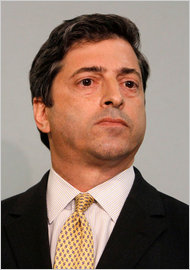 Jacquelyn Martin/Associated PressRobert S. Khuzami, the Securities and Exchange Commission’s director of enforcement.
Jacquelyn Martin/Associated PressRobert S. Khuzami, the Securities and Exchange Commission’s director of enforcement.
The Securities and Exchange Commission has brought civil actions against six former top executives at the mortgage giants Fannie Mae and Freddie Mac, saying that the executives did not adequately disclose their firms’ exposure to risky mortgages in the run-up to the financial crisis.
The cases represent the first major action by the federal agency in its more than three-year investigation of the government-controlled mortgage giants that were at the center of the housing crisis.
The agency filed complaints against three former executives at Fannie Mae – its chief executive, Daniel H. Mudd; chief risk officer, Enrico Dallavecchia, and executive vice president Thomas A. Lund.
Freddie Mac’s former chief executive, Richard F. Syron; Patricia Cook, its chief business officer, and executive vice president Donald J. Bisenius were also named in a separate complaint.
“Fannie Mae and Freddie Mac executives told the world that their subprime exposure was substantially smaller than it really was,” Robert Khuzami, the head of enforcement for the S.E.C., said in a statement. “These material misstatements occurred during a time of acute investor interest in financial institutions’ exposure to subprime loans, and misled the market about the amount of risk on the company’s books. All individuals, regardless of their rank or position, will be held accountable for perpetuating half-truths or misrepresentations about matters materially important to the interest of our country’s investors.”
As part of its announcement, the S.E.C. said that Fannie Mae and Freddie Mac agreed to settle with regulators and cooperate with its investigation of former executives. The Justice Department has also investigated the two mortgage giants, but no charges have been brought.
The S.E.C.’s cases against executives will rely heavily on whether the two mortgage companies underreported or misled investors about their ownership of subprime loans and mortgages that required few documents from borrowers in the years leading up to and including the housing bust.
The complaint alleges, for instance, that Fannie Mae executives described subprime loans as those made to individuals “with weaker credit histories” while only reporting one-tenth of the loans that met that criteria in 2007. The S.E.C. complaint contends that Freddie Mac executives falsely led proclaimed that certain businesses had virtually no exposure to ultra-risky loans.
The S.E.C., which spent roughly two years interviewing former and current employees of the two companies, has been under tremendous pressure to produce cases in the wake of the financial crisis.
Earlier this year, the agency sent Wells notices, which warn of potential enforcement actions, to a number of top executives at the two firms. At the time, Mr. Syron, Mr. Mudd, Mr. Bisenius and Mr. Piszel all challenged those potential accusations.
Mr. Mudd and Mr. Syron are the two most high-profile subjects of the complaint. Mr. Mudd is now chief executive of private equity giant the Fortress Investment Group. Mr. Syron is a former president of the American Stock Exchange and currently an adjunct professor and trustee at Boston College.
Lawyers for Mr. Syron and Mr. Mudd did not immediately respond to requests for comment. Lawyers for Mr. Dallavecchia, Mr. Lund, Ms. Cook and Mr. Bisenius could not immediately be reached for comment.
Fannie Mae and Freddie Mac were created by Congress to help facilitate homeownership. Though they do not loan money to borrowers themselves, they buy up mortgages from lenders and resell them in packages to investors, which allows banks and others to issue more loans. By 2005, the two companies began an aggressive push to expand their mandate to include less fortunate borrowers typically excluded, an effort encouraged by lawmakers and lenders. The companies were also looking to reclaim business from Wall Street, which was thriving in the world of subprime mortgages.
But by the middle of 2008, as the housing market was sinking, exposure to subprime and other weak borrowers threatened the two companies. The Bush administration stepped in to rescue the two mortgage giants in September 2008, taking control of them in the process. Since then, the government has loaned the Fannie Mae and Freddie Mac more than $100 billion.
That the settlement with the two companies did not include a fine reflects their financially precarious situation. The Obama administration announced plans earlier this year to wind down the two companies.
S.E.C. v Mudd, Dallavecchia and Lund
S.E.C. v Syron, Cook and Bisenius
Article source: http://feeds.nytimes.com/click.phdo?i=bf9883ed2fef5a99a98d85d406156d75
Speak Your Mind
You must be logged in to post a comment.